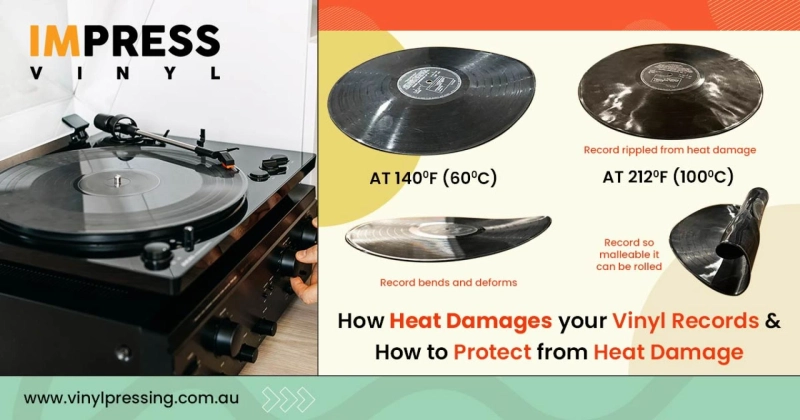Vinyl records have experienced a resurgence in popularity, captivating music enthusiasts with their nostalgic charm and warm sound. However, while vinyl records offer an unparalleled listening experience, they are also susceptible to environmental factors that can compromise their quality over time. Among these factors, heat stands out as a formidable adversary. In this article, we will delve into the detrimental effects of heat on vinyl records and provide essential tips to shield your cherished collection from irreversible damage.
The Vulnerability of Vinyl Records to Heat
Vinyl records are composed of a delicate blend of materials, including PVC (polyvinyl chloride), which can be highly sensitive to temperature changes. When subjected to excessive heat, vinyl records undergo physical and chemical transformations that result in irreparable damage. The most immediate concern is warping. High temperatures cause the vinyl to soften, rendering the record susceptible to warping or curling. This distortion not only affects the aesthetic appeal of the record but also leads to playback issues, causing skips, jumps, and audible distortion.
Sound Quality and Heat
Beyond the visible warping, heat damage can degrade the sound quality of your vinyl records. The microscopic grooves on the record's surface hold the key to its sonic performance. When exposed to heat, these grooves can become misshapen, altering the playback quality. This may result in a loss of detail, clarity, and depth in the music. The cherished analog warmth that vinyl records are celebrated for can be overshadowed by the hisses, pops, and crackles introduced by heat-damaged grooves.
Storage Matters: Protecting Your Collection
Protecting your vinyl records from heat damage begins with proper storage. Avoid storing your records in places prone to temperature fluctuations, such as attics, basements, or spaces near radiators or direct sunlight. Instead, opt for a cool, stable environment with consistent temperature and humidity levels. Investing in sturdy record storage solutions that shield your collection from external elements is crucial.
Preventive Measures
Controlled Environment: Store your vinyl records in a room with controlled temperature and humidity. Aim for a temperature range between 65°F and 70°F (18°C - 21°C) and a humidity level of around 40-50%.
Vertical Storage: Store your records vertically to prevent warping caused by the weight of stacked records. Use proper record storage crates or shelves that support the records evenly.
Inner Sleeves: Use anti-static inner sleeves to protect the surface of the record from dust and debris. These sleeves also provide an extra layer of protection against heat.
Outer Sleeves: Utilize high-quality outer sleeves to shield the record covers from potential heat sources, preserving their artwork and overall condition.
Distance from Heat Sources: Ensure that your records are placed away from radiators, heaters, and direct sunlight, as these can significantly elevate the temperature in their proximity.
Regular Inspection: Periodically inspect your vinyl records for any signs of warping or heat damage. Early detection can help prevent further deterioration.
Rescuing Heat-Damaged Records
If you discover that one of your vinyl records has been subjected to heat damage, all hope is not lost. There are professional services that specialize in vinyl record restoration. These experts can utilize controlled heat and pressure to attempt to flatten warped records, restoring them as closely as possible to their original state. However, prevention remains the best course of action to maintain the integrity of your collection.
Conclusion
The resurgence of vinyl records in the modern era has sparked a renewed appreciation for analog music experiences. However, with this revival comes the responsibility to protect these fragile treasures from potential harm. Heat, a silent adversary, can wreak havoc on the integrity of your vinyl collection, affecting both visual appeal and audio quality. By understanding the detrimental impact of heat and implementing preventative measures, you can safeguard your vinyl records and ensure that they continue to provide the enchanting soundscapes that have enraptured music lovers for generations. Remember, a little care goes a long way in preserving the magic of vinyl for years to come.


